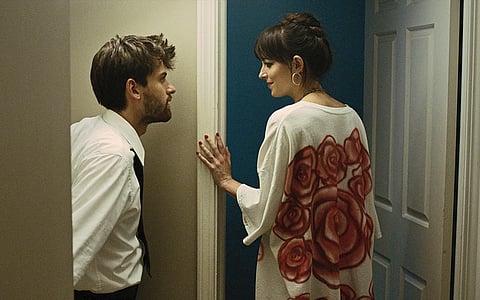
- Reviews
- Power List 2024
- Cannes 2024
- In-Depth Stories
- Web Stories
- News
- FC Lists
- Interviews
- Features
- FC SpecialsFC Specials

In Cha Cha Real Smooth, a 22-year-old drifter named Andrew falls for the mysterious new Dakota Johnson character in town. The attractive 30-something woman hires him as a babysitter for her autistic daughter while her fiance is away on work trips; he's also casually rebound-dating someone else on the side. Andrew's own mother is married to a man he dislikes. He can't afford to move out yet. He shares a room with his naive little brother, who's busy nursing his own first crush in school. In short, Andrew's situation is pretty complicated – he's in the sort of older-woman phase that's on the brink of turning him into a young-adult cautionary tale. It's hard to not get obsessed with a Dakota Johnson character after all.
But director-actor Cooper Raiff's little coming-of-age dramedy is unexpectedly bright and…kind. That's the word. Even its darkness is airy. For a film about a messy Newark non-starter, Cha Cha Real Smooth is full of optimism and integrity. By optimism, I don't mean a deludedly uplifting view of a tangled world. The feel-goodness is not tonal but textural – which is to say the writing believes in the inherent goodness of people, not stories. At the same time, it doesn't sacrifice maturity at the altar of dopey Judd Apatow benevolence (despite Leslie Mann's presence as Andrew's mother). People make mistakes, but those mistakes don't define their character. People are sad inside, but the sadness doesn't prevent them from being selfless. The film bounces around like a compassionate dog that refuses to judge humans for the roles they play in someone else's life.
For instance, Andrew's stepfather is an uptight but largely warm man – he cares for the family he's inherited, even if his temperament is at odds with theirs. It helps that the man is played by Brad Garrett, the cuddly Everybody Loves Raymond star who cannot look nasty even if he wanted to. Andrew's friend with benefits, Macy (Odeya Rush), is the girl he 'hangs out' with when things get heavy with the older woman (named Domino, naturally). But Macy is young, not flimsy; she's Gen-Z gossipy but not comic-silly – unlike a Mila Kunis on That '70s Show or a Mindy Kaling in The Office. When they have sex for the first time, you expect her to say something off-handedly cruel or dumb, but no such thing happens.
Then there's Domino's alpha-male fiance, Joseph (Raul Castillo), who looks and sounds like the trademark neglectful-and-toxic partner. He has that gruff voice, barely smiles, is ambivalent with Andrew and controlling with Domino. But he never becomes the villain in all this. In fact, he is responsible for a disarmingly adult moment towards the end, when he refuses to lash out in perhaps the most dramatic scene of the film. It's not that he doesn't have his flaws; it's just that his existence is absolute. He comes across as a real person with real problems and reasons, not a 'supporting character' in a film about a confused 22-year-old boy. There's also Domino's daughter, Lola (a lovely Vanessa Burghardt), who leads us down the narrative path of the differently-abled teen falling in love with her spirited babysitter. But her victory is trust, not love – her fondness for Andrew does not have to be validated by a romantic awakening. Andrew's mom suffers from bipolar disorder too, but the story refuses to needlessly scratch that wound for the sake of emotional gravity. You can sense the maker's affection for these peripheral faces – he respects them for who they are, not who he needs them to be to complete the tropes.
At the center of it all is of course Andrew and Domino. Domino loves how effortless Andrew is, both as a person and as Lola's new babysitter. She sees in him everything she wanted back in a youth that was hijacked by motherhood. But at some point, she recognizes that she is now the "what's good for me" companion, not the "forbidden fruit" lover. Everything about Dakota Johnson screams otherwise, so that's just smart casting. The storytelling is perceptive too, because Andrew's mother is in the same phase after a failed first marriage – she now settles for stability, not all-consuming desire – and Andrew's heartbreak with Domino likely leads him to read his mother's heart better. It helps him understand that compromise is not the opposite of love.
A lot of the film's smooth but not simplistic reading of human conflict stems from the way Andrew is performed. 24-year-old director Cooper Raiff plays him with wide eyes and boundless charm, which is saying something in an age where nihilism is often considered the cornerstone of art. Andrew truly likes people, not just the idea of them, which is why the setting – where he gets hired as a party starter for the town's Bar Mitzvah ceremonies – becomes an extension of his generous persona. His charisma is clean and smart; he's a giver, yet to be tarnished by the wants of adulthood. He also thinks he's an old soul – the film opens with school-going Andrew proposing to a 20-something girl – but there is at once no bitterness about the rejection of his instincts. I believe it takes immense grace and insight to make a film like this at a young age. It's usually the rawness that defines the finest of next-gen filmmakers – Xavier Dolan, for example. But Raiff seems to be a rare artist who gets that the world is only as difficult as the people who shape it. He gets that, at the core of it all, every human is gracious until proven rude. And that every experience is functional until the movies tell us otherwise.